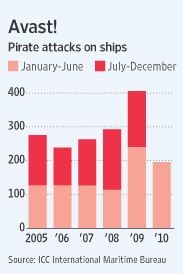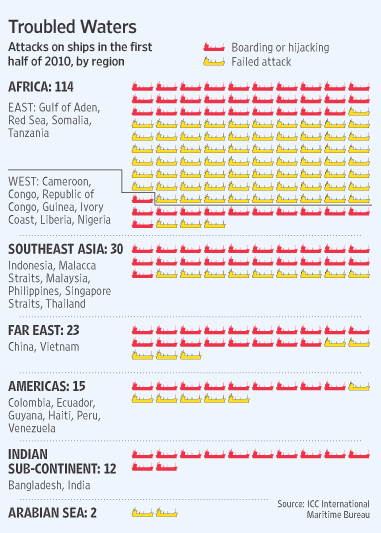Pirates are other guys who dressed funny, and lived hundreds of years ago.
Pirates are Somalians who plunder ships.
Very few people, I think, really approve of pirates: although they make dandy characters in adventure stories. But trying to nail down what makes a person a pirate, and make the definition stick in a court of law: that's not so easy.
Thrashing out what, exactly, is piracy - and who, exactly, is a pirate is a very practical matter for some lawyers in Norfolk, Virginia:
"Who's a Pirate? In Court, A Duel Over Definitions"What, exactly, is a pirate?"
Law, The Wall Street Journal (August 14, 2010)
"Not since Lt. Robert Maynard of the Royal Navy sailed back triumphantly to nearby Hampton Roads in 1718 with the severed head of Blackbeard swinging from his bowsprit has this Navy town been so embroiled in the fight against piracy.
"For the first time since the Civil War, accused pirates will be put on trial this fall in a federal courtroom. The defendants are six Somali men fished out of the Gulf of Aden, between Somalia and Yemen, in April after allegedly firing on a U.S. Navy ship, which blew apart the tiny skiff they were on.
"Prosecuting pirates, rather than hanging them from the yardarm, is the modern world's approach to the scourge of Somali piracy that has turned huge swathes of the Indian Ocean into a no-go zone for commercial vessels.
"But there's a problem: Some 2,000 years after Cicero defined pirates as the "common enemy of all," nobody seems able to say, legally, exactly what a pirate is.
"U.S. law long ago made piracy a crime but didn't define it. International law contains differing, even contradictory, definitions. The confusion threatens to hamstring U.S. efforts to crack down on modern-day Blackbeards.
"The central issue in Norfolk: If you try to waylay and rob a ship at sea-but you don't succeed-are you still a pirate?..."

This isn't a silly question - and it's not, I think, something dreamed up by bleeding-heart liberals or [insert your favorite conspirators] to subvert truth, justice, and the American way.
Three centuries back, when Captain Edward Teach/Blackbeard (1680-1718) made his way into the history books - and America's cultural memory - defining a pirate seems to have been fairly straightforward. In the European colonies, at any rate.
A pirate was someone who harassed or plundered your monarch's interests. Or someone identified as a pirate by your monarch. The system was simple, fairly straightforward, and - for the most part - effective.
That was then, this is now.
Corny as this sounds, America is a country that's ruled by law, not the whims of whoever's in charge at the moment. Yes, I know that stupid, wrong things have been done in the past - and will continue to be done. I'm not talking about the comparatively few times that the system hasn't - and doesn't - work. I'm talking about the way it is supposed to work. And, eventually, does.
(For example: we finally outlawed slavery - after about a century, and a major war; and the federal government got around to acknowledging that rounding up people because their ancestors had lived in Japan was stupid and wrong.)
Blackbeard and the other pirates whose activities inspired adventure stories have been dead for a long time. Piracy? Not so much.

(ICC International Maritime Bureau, via The Wall Street Journal, used w/o permission)
Piracy is still a very real problem: and it's not limited to waters off Somalia.
Dealing with piracy, while working within a framework of law that's intended to protect us from each other and - importantly - from whatever impulse seizes our leaders at the moment.
Besides a quick overview of the last few thousand years of piracy, The Wall Street Journal gives this look at 20th-century lawyers trying to sort sense out of accumulated laws and regulations:
"...The prosecution has leaned heavily on a 1934 ruling by Britain's Privy Council, which pondered the case of a similarly failed attack at sea, near Hong Kong. In that case, the jury found the defendants guilty, but said its verdict was subject to the question of whether it's really piracy if no actual robbery occurs. The court in Hong Kong said it isn't, and acquitted the attackers.I'm inclined to agree with them - but realize that "common sense" depends on what a culture assumes about the nature of reality and human affairs: and, in cases like this, the ideological quirks of leaders.
"The Privy Council members, however, after hacking through thickets of legal technicalities, ultimately reached a different conclusion. 'Actual robbery is not an essential element in the crime of piracy,' they said; 'A frustrated attempt to commit piratical robbery is equally piracy.'
"They added, with more than a hint of exasperation: 'Their Lordships are almost tempted to say that a little common sense is a valuable quality in the interpretation of international law.'..."
(WSJ)

No comments:
Post a Comment